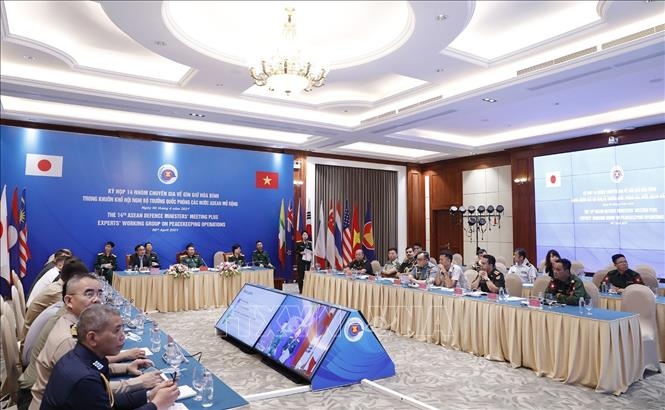Vietnam affirms its role in multilateral co-operation mechanisms
VOV.VN - The nation has proactively fulfilled its dual role as a non-permanent member of the UN Security Council, whilst also affirming its role, prestige, position, and contributions to multilateral co-operation mechanisms as part of regional peacekeeping operations.

The Ministry of National Defence held the 14th meeting of the Experts’ Working Group (EWG) on peacekeeping operations in the fourth cycle for the 2021 to 2023 period via video conference on April 6, within the framework of the ASEAN Defence Ministers’ Meeting Plus (ADMM+).
The event was co-chaired by the head of a Vietnamese group of experts on peacekeeping operations, Col. Mac Duc Trong, and his Japanese counterpart Matsuzawa Tomoko.
This marked the first activity of the EWG on peacekeeping operations in the fourth cycle, thereby showing that the country has proactively fulfilled its dual role as a non-permanent member of the UN Security Council and co-chair of the event alongside Japan. This is in addition to affirming the nation’s role, prestige, position, and contributions to multilateral co-operation mechanisms in the field throughout the region.
It also provides a platform in which to enhance the sharing of expertise and experience between various ASEAN member states and the UN in an effort to boost women’s participation in peacekeeping operations.
Upon addressing the event, Col. Trong said that the past decade since its establishment has seen the ADMM make remarkable contributions to ramping up national defence-security co-operation for the purpose of maintaining peace, stability, and development in the region and throughout the world.
The ADMM is primarily focusing on seven practical areas of co-operation, with UN peacekeeping operations being one of the major contents.
Amid the spread of the novel coronavirus (COVID-19) pandemic which has had a long-term political and economic toll, the occasion reflects both Vietnamese and Japanese efforts to maintain the EWG’s activities.
He therefore suggested that delegates offer their opinions on reviewing activities in the third cycle, devise plans head the fourth cycle and thematic discussions on women’s participation in peacekeeping activities, whilst discussing the challenges in dealing with sexual violence and abuse.
Following the success of co-chairs Indonesia and Australia in the previous cycle, the country and Japan have worked closely together since last year in order to ensure success during this fourth cycle.
In response, Tomoko said Japan will mark the 30th anniversary of its participation in UN peacekeeping operations during the fourth cycle.
She also expressed her confidence that discussions taking place at the event will make positive contributions to each country’s commitments and peacekeeping operations.
In the role of co-chair, Japan pledged to do its utmost over the next three years to make the fourth cycle a success, thereby bringing about numerous benefits to all member states, she said.
Approximately eight years after joining UN peacekeeping operations, the nation has sent three teams with 189 officers to level-two field hospitals, including 33 women, or over 17%, which is higher than the 8% to 10% requested by the UN.
The country has also dispatched a total of 54 officers to UN missions in the Central African Republic, South Sudan, and UN headquarters, including four women, accounting for 7.4% of the total.

